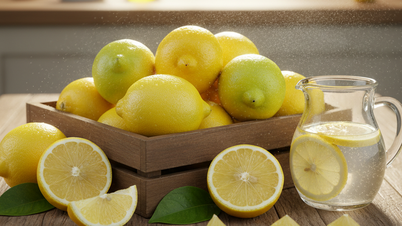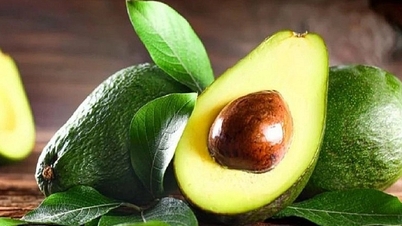Feeling bored or stressed
When people feel too stressed, the adrenal glands release cortisol, which increases cravings, especially for salty, fatty, or sugary foods. Similar to when bored, some studies show that consuming salty foods stimulates the reward system, increasing dopamine levels, making people feel happy and comfortable.

When people feel too stressed, the adrenal glands release cortisol, which increases appetite, especially for salty foods.
Photo: AI
If you’re constantly reaching for salty foods when you’re stressed, your body may be warning you of chronic stress. Notably, a 2020 study found that eating a lot of salty foods can make your body crave more salt, according to Verywell Health .
The body is dehydrated
Salt acts as an electrolyte for daily human activities. When the body is dehydrated, the electrolytes will be imbalanced, which can lead to cravings for salty foods.
In addition, people who sweat a lot due to their constitution or strenuous exercise also experience the above phenomenon. This is a reaction of the body and brain to rebalance electrolytes, which is essential for the overall health of humans. To avoid this condition, people should drink water regularly and live a moderate life.
Lack of sleep
Lack of sleep increases the likelihood of people snacking late at night. Experts say reduced sleep increases cravings for high-calorie foods, including salty or sweet foods.
When the body is sleep deprived, hormones signal the brain to “reward” itself with a salty snack.

When the body lacks sleep, hormones will signal the brain to "reward" itself with a salty dish.
Photo: AI
Start of menstruation
Premenstrual syndrome (PMS) refers to the physical and psychological signs that occur before a woman's menstrual cycle.
Common symptoms include dehydration and changes in appetite, leading to cravings for salty foods. Mild dehydration during PMS can also lead to these symptoms.
Iron deficiency
A recent study found that iron deficiency anemia (which occurs when the body doesn't produce enough iron to make red blood cells) leads to intense salt cravings.
There are many different causes of iron deficiency anemia, including blood loss, kidney disease, and other health conditions. In addition to the causes listed above, you may also experience symptoms such as fatigue, dizziness, and cold hands and feet.
Genetic diseases
Certain genetic diseases can affect sodium levels in the body.
Addison's disease (adrenal insufficiency) occurs when the adrenal glands don't produce enough cortisol. Without this hormone, the body quickly becomes sodium-depleted, leading to increased salt cravings.
Bartter syndrome affects the kidneys' ability to absorb salt and electrolytes, which are then excreted in the urine. Patients with the syndrome will always crave salty foods.
Use of some specific drugs
Certain medications that affect the adrenal glands (which produce hormones for metabolism, the immune system, etc.) can make you crave salty foods. These include:
- Tramadol
- Antifungal drugs
- Glucocorticoids
- Immunosuppressants
- Protein inhibitors
Experts recommend consulting a doctor before stopping any medication that may cause salt cravings.
What can be done to reduce salt?
The recommended diet for each person is to consume less than 2.3g of salt per day. In particular, for adults with a history of high blood pressure, the American Heart Association recommends consuming only about 1.5g of salt per day to avoid diseases related to blood pressure, heart disease and stroke.
To reduce salt in daily meals, here are some tips:
- Taste food first to avoid adding salt out of habit.
- Replace salt with healthier seasonings like garlic, herbs, pepper, vinegar or lemon.
- Make your own snacks at home to control the amount of salt in each serving.
- Limit canned foods or rinse some canned foods, such as beans or vegetables, to reduce salt content.
- Check nutrition facts, choose products with less than 140 mg of salt, and avoid choosing dishes that list salt at the top of the ingredient list, according to Verywell Health .
Source: https://thanhnien.vn/canh-bao-cac-dau-hieu-suc-khoe-khi-them-muoi-185250628224649498.htm


![[Photo] Many streets in Hanoi were flooded due to the effects of storm Bualoi](https://vphoto.vietnam.vn/thumb/1200x675/vietnam/resource/IMAGE/2025/9/29/18b658aa0fa2495c927ade4bbe0096df)
![[Photo] General Secretary To Lam attends the ceremony to celebrate the 80th anniversary of the post and telecommunications sector and the 66th anniversary of the science and technology sector.](https://vphoto.vietnam.vn/thumb/1200x675/vietnam/resource/IMAGE/2025/9/29/8e86b39b8fe44121a2b14a031f4cef46)


![[Photo] National Assembly Chairman Tran Thanh Man chairs the 8th Conference of full-time National Assembly deputies](https://vphoto.vietnam.vn/thumb/1200x675/vietnam/resource/IMAGE/2025/9/29/2c21459bc38d44ffaacd679ab9a0477c)
![[Photo] General Secretary To Lam receives US Ambassador to Vietnam Marc Knapper](https://vphoto.vietnam.vn/thumb/1200x675/vietnam/resource/IMAGE/2025/9/29/c8fd0761aa184da7814aee57d87c49b3)





























































































Comment (0)